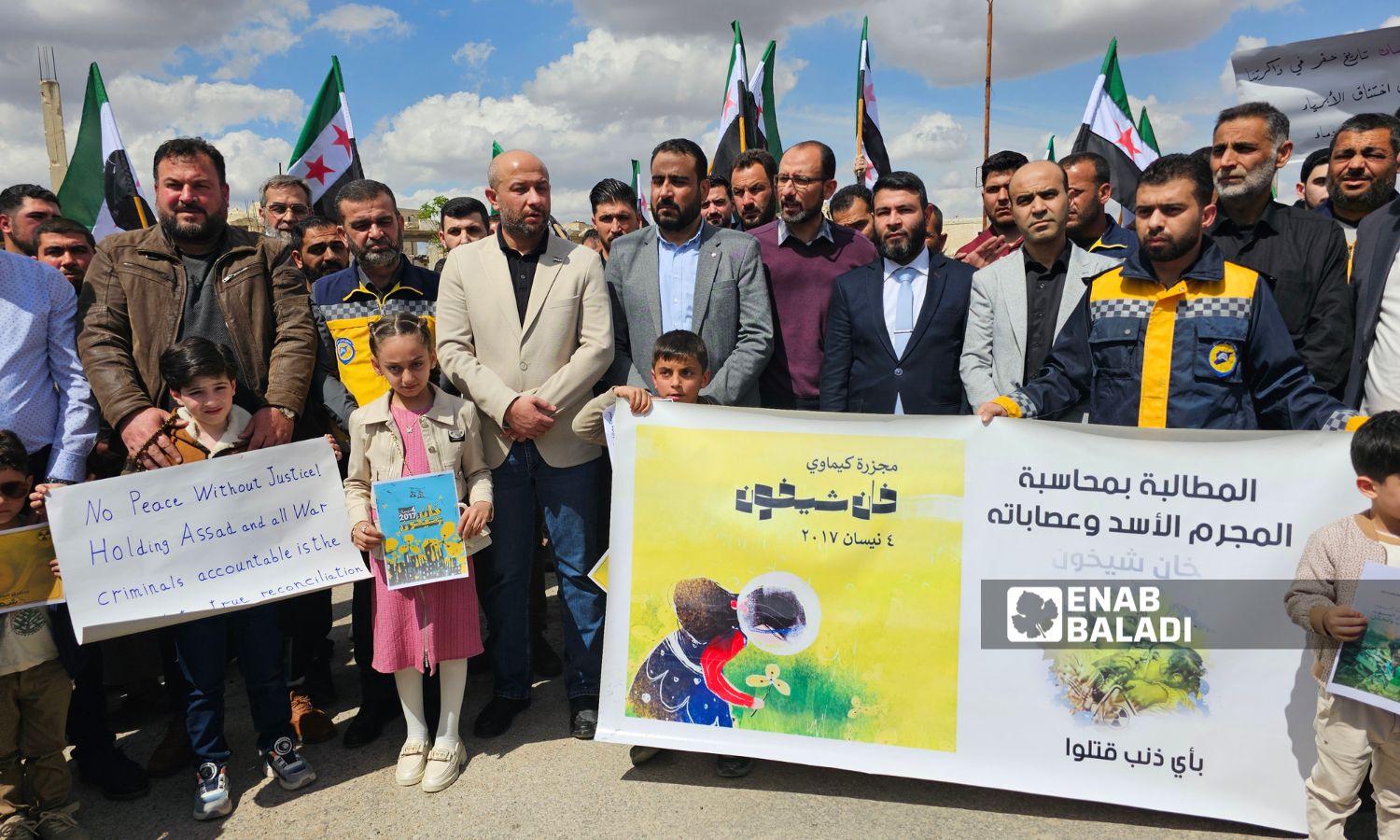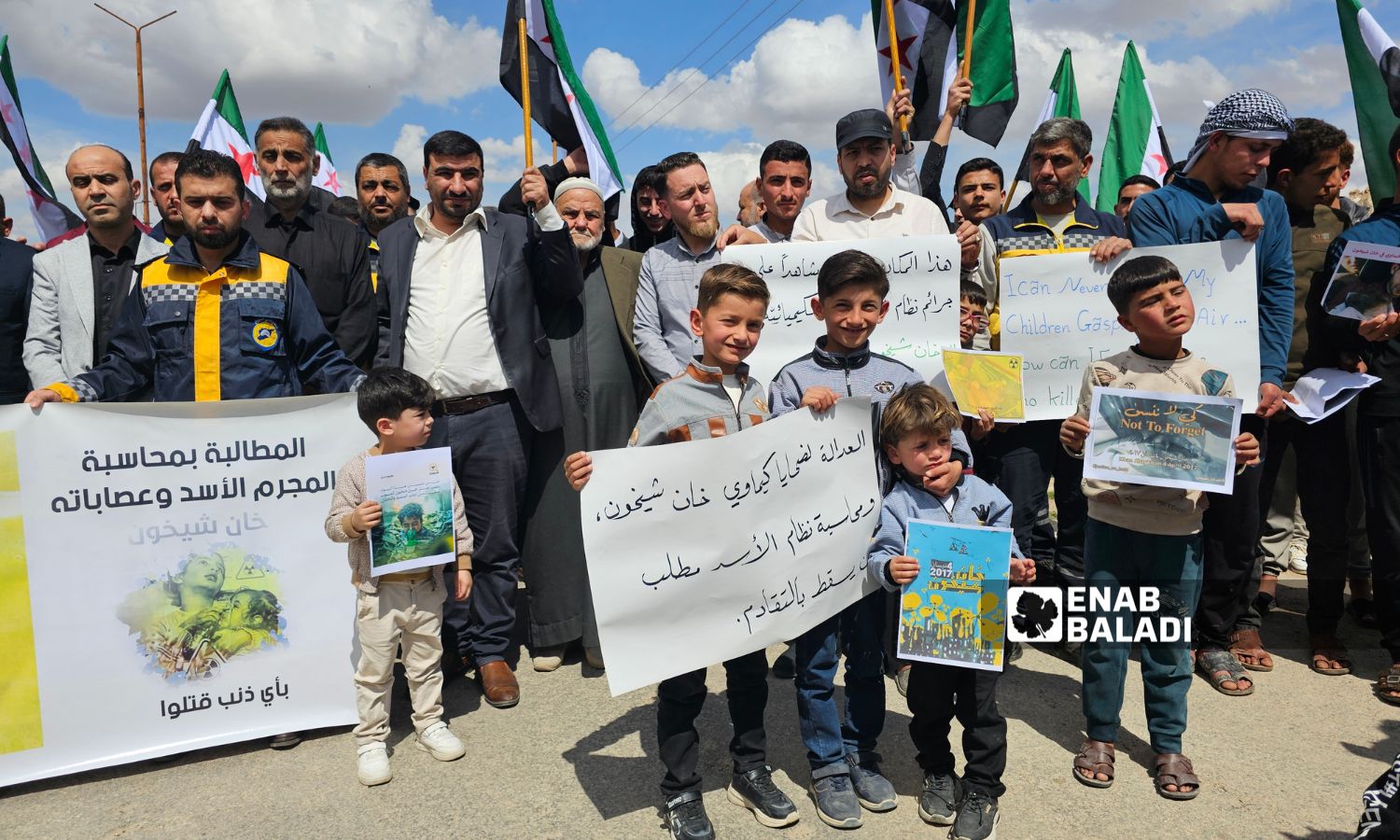
Syrian Foreign Minister Asaad al-Shibani pledged to continue working to achieve justice and hold accountable those responsible for the chemical crime in Khan Sheikhoun, affirming that a new Syria will be a safe homeland for all Syrians based on principles of freedom, dignity, and justice, in light of the eighth anniversary of the massacre.
On Friday, April 4, Syrian Minister of Emergency and Disaster Management Raed al-Saleh participated in a solidarity stand to remind everyone of the Khan Sheikhoun chemical massacre, in support of the survivors and the victims’ families, and to demand accountability for the criminal Assad regime for its crimes against Syrians, according to a statement from the Syria Civil Defence.
The participants emphasized the necessity of pursuing paths of justice and accountability, and handing over the criminals, the regime leader, and all those involved in killing Syrians to the courts.
They asserted that transitional justice and civil peace in Syria can only be achieved through accountability, and that impunity is a continuation of crime and a hindrance to peace in Syria and the rest of the world, as per the statement.

A solidarity stand in memory of the eighth anniversary of the Khan Sheikhoun chemical massacre – April 4, 2025 (Enab Baladi/Iyad Abdul Jawad)
Eight years ago, at seven o’clock in the morning on April 4, 2017, the residents of Khan Sheikhoun in Idlib countryside woke up to the sounds of intense bombing accompanied by a strange odor. Soon, civilians began to collapse on the ground after suffocating from the sarin gas that the regime forces bombed the city with.
Moments after the bombing, images of civilians appeared on social media, looking as if they were asleep, unable to be saved by sheltering in basements from the deadliest weapon the regime had used, making them victims of a massacre without shedding a drop of blood.
The Syrian Network for Human Rights (SNHR) documented the killing of 91 civilians, including 32 children and 23 adult women, suffocated by sarin gas in Khan Sheikhoun, along with approximately 520 injuries.
On the same day, the Civil Defence received reports through its observation posts about the bombing of Khan Sheikhoun, and sent a team there to respond to the bombing and assist the injured, assuming it was just conventional bombing. However, the team was surprised upon arrival that the airstrikes were not ordinary.
Abdul Hamid Qutini, a volunteer with the Syria Civil Defence who participated in the response to the Khan Sheikhoun chemical attack, stated to Enab Baladi earlier, “When we arrived at the bombing site, we were shocked to find a large number of people suffering from suffocation and convulsions, including volunteers from the first responding team. The symptoms alongside the foul odors were evidence to us of a chemical attack, so we urgently called via the wireless communications for other teams to help.”
Qutini added, “The Civil Defence teams faced many difficulties during the response to the chemical attack on Khan Sheikhoun, the most significant being the lack of protective masks against toxic gases and the absence of detection devices, in addition to the large number of injured and casualties and injuries among first responders.”
The situation was further complicated for the Civil Defence teams because the ousted Assad regime also targeted several medical points in southern Idlib and northern Hama two days prior to the Khan Sheikhoun attack, to prevent the Civil Defence (White Helmets) from quickly aiding civilians after the chemical attack, resulting in many casualties.
About six months after the massacre, specifically on October 27, 2017, an international report prepared by the OPCW-UN Joint Investigative Mechanism confirmed the Assad regime’s responsibility for launching sarin gas in Khan Sheikhoun on April 4, 2017.
The post Solidarity stand to commemorate 8th anniversary of Khan Sheikhoun chemical massacre appeared first on Enab Baladi.